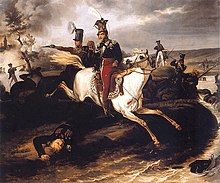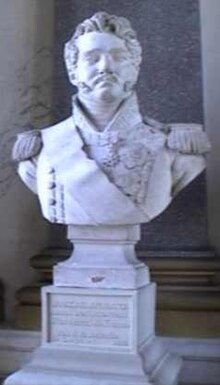Józef Antoni Poniatowski





Józef Antoni Poniatowski (old spelling often also Poniatowsky ; * May 7, 1763 in Vienna ; † October 19, 1813 near Leipzig ) was a Polish aristocrat , prince , general , war minister of the Duchy of Warsaw , imperial prince in the Holy Roman Empire and marshal of the Empire .
Family background
Poniatowski was born as the son of Andrzej Poniatowski and his Bohemian-Austrian wife Thérèse Countess Kinský von Wchinitz and Tettau in Palais Kinsky in Vienna. He came from a relatively old (first noted in 1522) but little-known Polish family of the middle nobility . This had through the support of the Swedish King Karl XII. for Józef's grandfather, the future voivod Stanisław Poniatowski , who worked as a diplomat in the service of Sweden , gained influence. In 1765 Józef's father succeeded in gaining the title of German imperial prince in addition to the Polish prince title .
Józef's uncle Stanislaus II August Poniatowski was the last elected king of Poland, who, however , could not prevent the partition of his country and ultimately abdicated in 1795. At his coronation in 1764, despite opposition from the Sejm, he raised his three brothers to the rank of Polish prince. According to Jan Dobraczyński , Poniatowski's mother and the mother of the Austrian general Karl Philipp zu Schwarzenberg were sisters, making Poniatowski and Schwarzenberg cousins. Official pedigrees and family chronicles do not confirm this, however.
Another uncle was Philipp Kinsky von Wchinitz and Tettau .
The early years in Austria and in the war against Turkey
Józef's father was a general in the service of the Imperial Army , but died when his son was 10 years old. Therefore, the uncle transferred several goods to him for financial security and supervised his upbringing. In 1779 he was brought to Warsaw and made familiar with court life. On February 7, 1780, Poniatowski also entered the imperial army, in 1781 he was promoted to secondary third master , in 1782 to squadron chief and in 1784 to major . In 1784 he went to Lemberg in Galicia to train Polish soldiers in the new Ulan division . In 1785 he was appointed second lieutenant and in 1786 first lieutenant colonel in the Chevaulegers regiment of the Roman-German emperor , and during this time he made friends with the later Austrian general Karl Mack von Leiberich . With Emperor Joseph II he went to Pest in January 1788 to prepare for the Turkish War . In April 1788, Poniatowski was seriously wounded in the thigh while storming the fortress Šabac (near Belgrade ).
Russo-Polish War of 1792
On May 19, 1792, the Russian Empire , supported by the Targowica Confederation , invaded Poland, which led to the outbreak of the Russo-Polish War of 1792 , with the aim of reversing the Polish reforms, but above all the May constitution do. Prince Poniatowski, appointed Commander in Chief of the Polish Army , won the Battle of Zielence in what is now Ukraine on June 18 and became the originator of the Virtuti Militari Order . He also received the only commander's cross of this order awarded in the 18th century.
The Kościuszko Uprising and Retreat into Private Life
After the lost war and the Second Partition of Poland following the defeat in 1793, Poniatowski went into exile in Vienna and Brussels , but returned to Poland in 1794 to take part in the national uprising of General Tadeusz Kościuszko , where he took part in the battles for Warsaw . The failure of the uprising was followed by the Third Partition of Poland, which ended the existence of the Polish state in 1795. When in 1798 his uncle, who deposed Polish king Stanislaw II August., Died in Russia, traveled Poniatowski to Saint Petersburg and became the new Russian tsar I. Paul received. In 1802 he traveled to Berlin and, through the mediation of his friend Prince Anton Radziwiłł, established relationships with the Prussian court. As a result, some of his confiscated property was returned to him. At the same time he received from King Friedrich Wilhelm III. the knighthood of the black and red eagles .
The Duchy of Warsaw and the Austro-Polish War of 1809
After Prussia's defeat by Emperor Napoléon Bonaparte , a new Polish state was formed with its own armed forces, which Poniatowski helped to establish. After the Peace of Tilsiter in 1807 he became war director in the government of the Duchy of Warsaw under the scepter of the Saxon king and commander in chief of the Polish troops. He built up a new Polish army of 30,000 men. What Poniatowski had to do, however, was determined by Napoleon and some of his marshals. In the war against Austria in 1809 Poniatowski concentrated 14,000 men in front of Warsaw. As a result of the Battle of Raszyn , he had to retreat to Warsaw and, as a result of an armistice with Archduke Ferdinand, evacuate the left bank of the Vistula including Warsaw. Then he surprisingly began a successful campaign of conquest in Galicia to the right of the Vistula , where he was welcomed as a liberator. On June 2nd, the Austrians also had to give up Warsaw. Meanwhile the Russians had marched into Galicia. Poniatowski's negotiations with them failed. The Russians stayed to the right of the Vistula, behaved like conquerors in the country and avoided any fight with the Austrians. After Napoléon's victory in the Battle of Wagram , Ferdinand withdrew over the Jablunka Pass and Poniatowski was able to move into Krakow on July 15, 1809 , which the Russians had occupied in a coup d'état the previous evening . Napoléon honored him with a golden honorary saber and appointed him Grand Officer of the French Legion of Honor .
The Grande Armée and the Russian campaign of 1812
In January 1810 Poniatowski returned to Warsaw and in February went to Dresden to discuss another organizational change in the army with the Saxon king; he visited Warsaw and Cracow in the same year. In March 1812, under Louis-Alexandre Berthier, the V Corps of the Great Army was formed from the three divisions of the Duchy . In June Poniatowski took over the command of the corps and marched under the command of the King of Westphalia and Napoleon's brother, Jerome , into the field . He took part with his troops in the battles near Smolensk and Borodino and entered Moscow on September 15, 1812 with Emperor Napoleon . However, he stayed there for only two days and then followed the Russian troops on Kalugaer Chaussee.
Battle of Nations, death and burial
After crossing the Bjaresina , Poniatowski reached Warsaw via Vilnius on December 13th and went from there to Krakow, where he immediately began building a new Polish army. He again strictly refused an offer by Prussia and Russia (early 1813) to secede from Napoleon, his 14,000-strong troop ("Krakussen") was incorporated into Napoleon's Great Army as the VIII. Corps in June 1813 and he himself was put on an equal footing with the French marshals . During the armistice he met Napoleon in Dresden. During the march on Leipzig, his corps brought up the rear. In the Battle of the Nations near Leipzig , his troops formed the right wing of Napoleon's troops in the south and south-east of Leipzig. On October 16, 1813, the Emperor named Poniatowski Marshal of France. After the lost battle, Poniatowski was in command of the rearguard and covered Napoleon's retreat. Because the bridge over the White Elster was blown up prematurely, the way back was cut off for him; When he tried to cross the Magpie on horseback after being wounded several times, he drowned in the river.
The body was only found by fishermen on October 24th and laid out in the Johanniskirche in the Grimmaische Vorstadt, embalmed and initially buried in the council crypt of the Johannisfriedhof . After its transfer to Poland, the body was buried on September 10, 1814 with the consent of the Russian tsar in the vault of the Holy Cross Church in the center of Warsaw, later transferred to Krakow and buried in the Wawel Cathedral on July 22, 1817 . In the St. Leonhard's crypt, where Tadeusz Kościuszko and Władysław Sikorski were later buried, he was given the honor of being next to King John III. Sobieski to rest.
A memorial plaque remained in the council crypt of the old Johannisfriedhof in Leipzig. It bore the inscription “Josepho Principi Poniatowski exercitus Poloni duci supremo in pugna ad Elystrum post foederatorum secessionem d. XIX. Oct. MDCCCXIII. Urgentia quum sisteret fata submerse. Commilitones. "(The Prince Poniatowski, first commander of the Polish army, who, when he passed in the battle of the Elster, after separation of the allies on 19 Oct. 1813 great tribulations, drowned. The comrades.) After the Second World War was brought this tablet to Poland. There is a copy of the plaque on the wall of the 4th section of the Old St. John's Cemetery with minor textual deviations from the original.
progeny
Prince Józef Antoni Poniatowski, known as Le bel Prince Pepi , had never married and had only one son, Countess Potocka, born Zofia Czosnowska: Karol Józef Maurycy Poniatowski (born December 18, 1809 in Warsaw; † February 18, 1855 in Tlemcen , Oran province ), who joined the French army after 1830 and made it major general and officer of the Legion of Honor.
Honors
The name of Poniatowski is entered on the triumphal arch in Paris in the 13th column, his bust was exhibited in the Battle Gallery of the Palace of Versailles , which opened in 1837 .
In 1829 the Danish sculptor Bertel Thorvaldsen erected his equestrian monument on Sächsischer Platz in front of the Saxon Palace in Warsaw , which was based on the equestrian statue of Marcus Aurelius on the Capitol in Rome. Destroyed by the National Socialists , the statue was refilled in 1947 and sent to Warsaw as a gift from the Danish people. Today it stands in the courtyard of the Presidential Palace in Warsaw.
Before 1840, a memorial stone was erected at the place where he drowned in the White Elster.
literature
- Frans G.Bengtsson: Karl XII: s levnad , I - II. Malmö 1969.
- Simon Konarski: Armorial de la noblesse polonaise titrée . Paris 1957.
- Zbigniew Puchalski, Ireneusz J. Wojciechowski: Ordery i odznaczenia polskie i ich kawalerowie. Warsaw 1987.
- Jan Dobraczyński : At the gates of Leipzig. Life and death of Józef Poniatowski . Berlin 1985.
Web links
Individual evidence
- ^ Jan Dobraczyński: Before the gates of Leipzig. Life and death of Józef Poniatowski . Union Verlag Berlin 1985, pp. 42, 63 and 290.
- ^ Heinrich Heinlein: The Leipzig cemetery in its current form. Leipzig 1844, p. 96.
| personal data | |
|---|---|
| SURNAME | Poniatowski, Józef Antoni |
| ALTERNATIVE NAMES | Poniatowski, Józef Antoni Fürst |
| BRIEF DESCRIPTION | Polish general, Marshal of France |
| DATE OF BIRTH | May 7, 1763 |
| PLACE OF BIRTH | Vienna |
| DATE OF DEATH | October 19, 1813 |
| Place of death | Leipzig |


